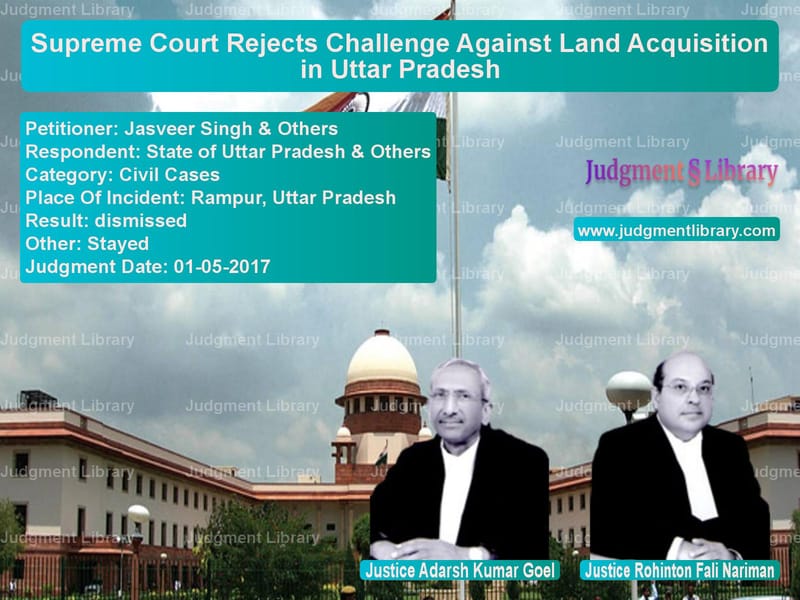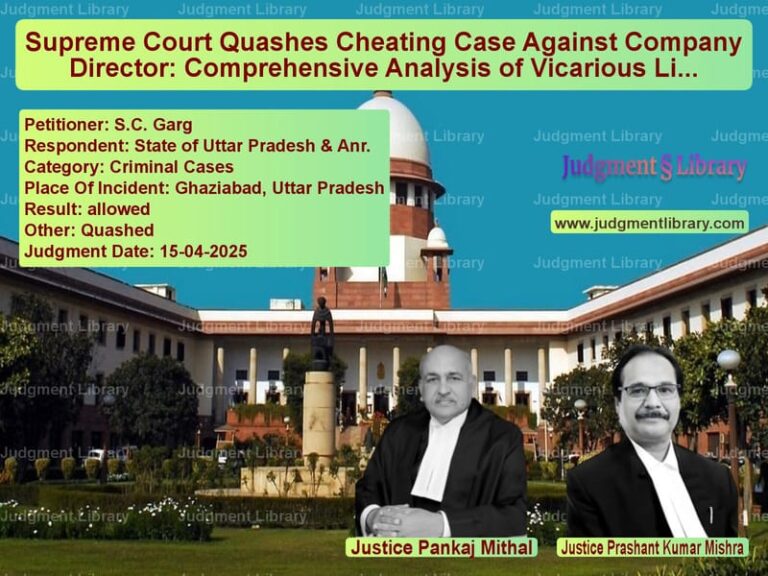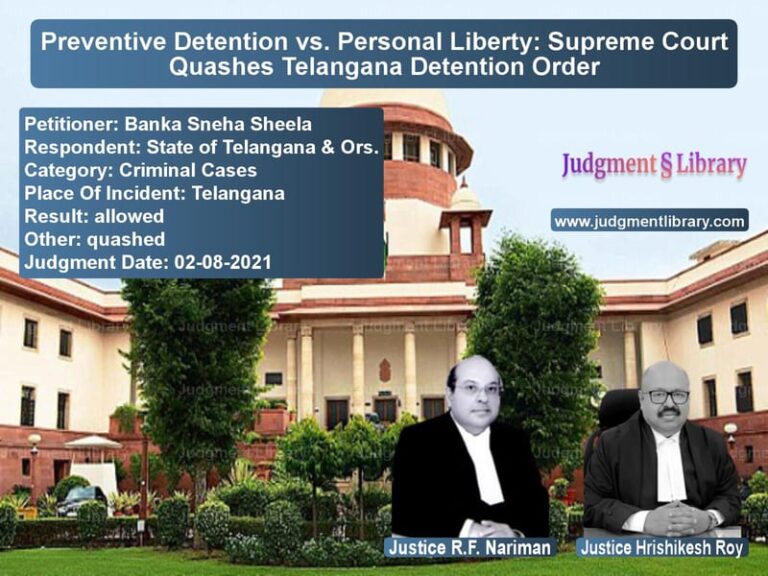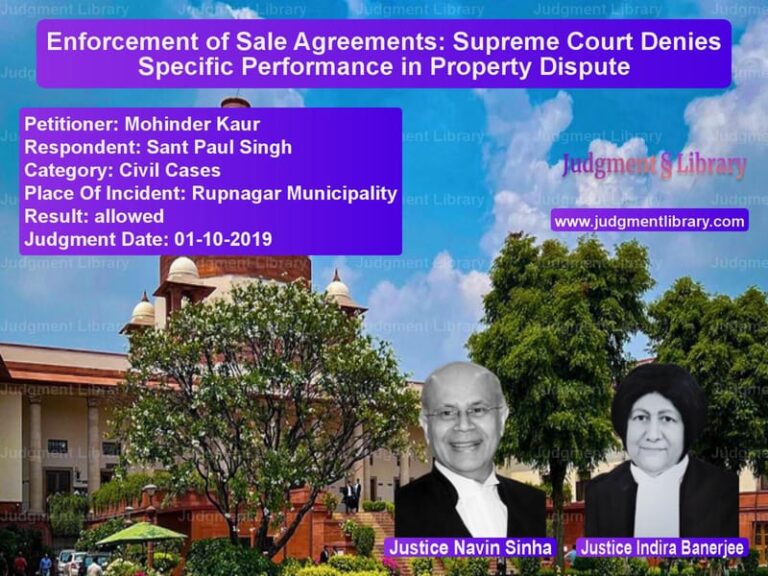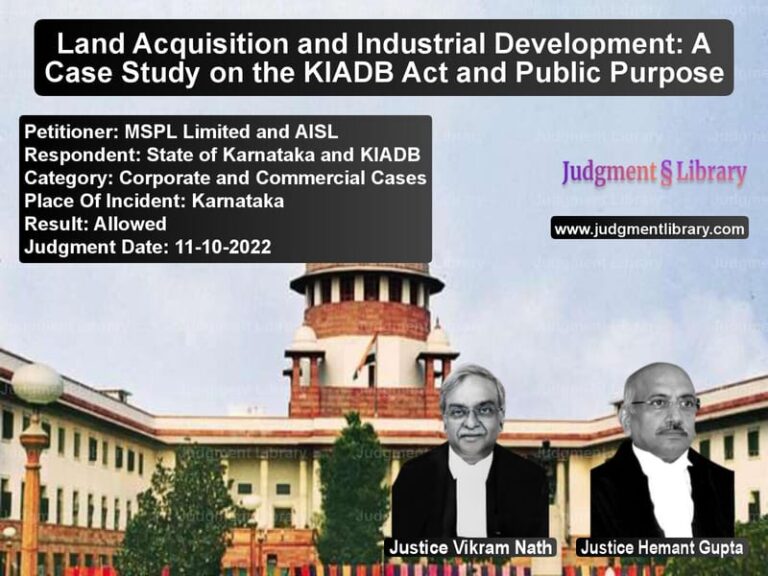Supreme Court Rejects Challenge Against Land Acquisition in Uttar Pradesh
The Supreme Court of India, in its judgment dated May 1, 2017, in the case of Jasveer Singh & Others vs. State of Uttar Pradesh & Others, upheld the land acquisition process for the construction of a broad gauge railway line between Rampur and Haldwani. The appellants challenged the acquisition proceedings, citing procedural lapses and the alleged invalidity of the compensation award. However, the Court ruled that the challenge was barred by delay and laches and affirmed the acquisition’s legality.
Background of the Case
The land acquisition process began with a notification under Section 4 of the Land Acquisition Act, 1894, on August 18, 1981, invoking the urgency clause. Possession of the acquired land was taken on September 19, 1986, and the award was passed on September 22, 1986. The appellants had sought an enhancement of compensation through a reference under Section 18 of the Land Acquisition Act, which was adjudicated by the District Judge on December 7, 1988. The first appeal against this decision was heard by the High Court and later reviewed by the Supreme Court.
Despite receiving compensation and participating in the reference proceedings, the appellants filed a writ petition in 2005, seeking the quashing of the entire acquisition process, claiming that the award was invalid and that compensation should be determined at current market rates. The High Court dismissed the petition in 2014, ruling that the challenge was barred by delay and laches. The appellants then approached the Supreme Court.
Legal Issues Examined
The Supreme Court considered several key legal questions:
- Whether the land acquisition proceedings, initiated in 1981, could be challenged after several decades.
- Whether the compensation award passed in 1986 and later enhanced in 1988 could be deemed invalid.
- Whether the challenge to the acquisition was barred by laches.
- Whether the appellants were entitled to relief under the new Land Acquisition Act of 2013.
Arguments by the Appellants
- The appellants argued that the compensation award was not validly made and that the acquisition should be set aside.
- They contended that since the possession was taken long ago but the land had not been fully utilized, they should be compensated at present market rates.
- The appellants sought the application of the Right to Fair Compensation and Transparency in Land Acquisition, Rehabilitation and Resettlement Act, 2013.
Arguments by the Respondent (State of Uttar Pradesh)
- The State argued that the land acquisition process had been completed, and compensation had been duly awarded and accepted.
- It contended that the challenge was barred by delay and laches, as the acquisition had been finalized decades ago.
- The government maintained that the appellants had already pursued the reference process under Section 18, which had led to an enhanced compensation award.
- The State cited previous Supreme Court rulings where similar belated challenges to land acquisitions were rejected.
Supreme Court’s Observations
The Supreme Court reviewed the procedural history and made several key observations:
- The appellants had not challenged the acquisition at the time of notification or award but instead participated in the compensation proceedings.
- Having accepted compensation and pursued enhancement proceedings, they could not now challenge the validity of the acquisition.
- The principle of laches applied, as decades had passed since the acquisition, and allowing such belated challenges would create uncertainty in infrastructure projects.
- The claim for compensation under the 2013 Land Acquisition Act was unfounded, as the acquisition had been completed under the 1894 Act.
Final Judgment
The Supreme Court dismissed the appeals and upheld the High Court’s ruling, stating:
“The grievance of the appellants against the acquisition proceedings on the ground that the award was not a valid award was rejected and SLP was dismissed by this Court. The challenge of the appellants is barred by laches, and the said finding does not suffer from any infirmity.”
The Court reaffirmed that the appellants could not reopen the land acquisition process after having exhausted their remedies under the Land Acquisition Act of 1894.
Implications of the Judgment
This ruling has significant implications for land acquisition disputes and government infrastructure projects:
- Finality of Land Acquisition: The judgment reinforces that land acquisition cannot be challenged indefinitely, especially when compensation has been awarded and accepted.
- Deterrence Against Delayed Challenges: The ruling discourages landowners from raising belated objections to acquisitions that have been completed.
- Application of the 2013 Act: The Court clarified that landowners cannot seek retrospective benefits under the new Land Acquisition Act if the process was completed under the old Act.
- Stability for Infrastructure Development: The judgment ensures that infrastructure projects, such as railway lines, are not disrupted by delayed legal challenges.
Conclusion
The Supreme Court’s ruling in Jasveer Singh & Others vs. State of Uttar Pradesh & Others is a landmark decision that upholds the sanctity of completed land acquisition processes. By rejecting the challenge on the grounds of laches, the Court reaffirmed the principle that landowners cannot contest acquisitions after benefiting from compensation proceedings. This judgment serves as a crucial precedent in land acquisition jurisprudence, ensuring legal certainty for large-scale infrastructure projects.
Don’t miss out on the full details! Download the complete judgment in PDF format below and gain valuable insights instantly!
Download Judgment: Jasveer Singh & Othe vs State of Uttar Prade Supreme Court of India Judgment Dated 01-05-2017.pdf
Direct Downlaod Judgment: Direct downlaod this Judgment
See all petitions in Landlord-Tenant Disputes
See all petitions in Damages and Compensation
See all petitions in Property Disputes
See all petitions in Judgment by Adarsh Kumar Goel
See all petitions in Judgment by Rohinton Fali Nariman
See all petitions in dismissed
See all petitions in Stayed
See all petitions in supreme court of India judgments May 2017
See all petitions in 2017 judgments
See all posts in Civil Cases Category
See all allowed petitions in Civil Cases Category
See all Dismissed petitions in Civil Cases Category
See all partially allowed petitions in Civil Cases Category

